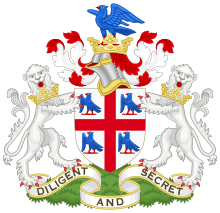
Back College of Arms Catalan Coleg yr Arfau Welsh College of Arms Danish College of Arms German College of Arms Spanish College of Arms French Lembaga Lambang ID College of Arms Italian 紋章院 Japanese College of Arms Dutch
 | |
 Headquarters of the College of Arms (2011), with the dome of St Paul's Cathedral behind | |
| Company type | Royal Corporation |
|---|---|
| Founded | 2 March 1484 (incorporated)[1] 18 July 1555 (reincorporated)[2] |
| Founder | Richard III of England Mary I of England & Philip II of Spain |
| Headquarters | 130 Queen Victoria Street City of London EC4V 4BT[3] |
Area served | England, Wales, Northern Ireland, Australia and New Zealand |
Key people | Edward Fitzalan-Howard, 18th Duke of Norfolk, Hereditary Earl Marshal; David White, Garter Principal King of Arms |
| Services | Recording, granting and regulation of heraldry, coats of arms and pedigrees |
| Parent | Royal Household of the United Kingdom[4] |
| Website | www |
The College of Arms, or Heralds' College, is a royal corporation consisting of professional officers of arms, with jurisdiction over England, Wales, Northern Ireland and some Commonwealth realms. The heralds are appointed by the British Sovereign and are delegated authority to act on behalf of the Crown in all matters of heraldry, the granting of new coats of arms, genealogical research and the recording of pedigrees. The College is also the official body responsible for matters relating to the flying of flags on land, and it maintains the official registers of flags and other national symbols. Though a part of the Royal Household of the United Kingdom, the College is self-financed, unsupported by any public funds.
Founded by royal charter in 1484 by King Richard III of England, the College is one of the few remaining official heraldic authorities in Europe. Within the United Kingdom, there are two such authorities, the Court of the Lord Lyon in Scotland and the College of Arms for the rest of the United Kingdom. The College has had its home in the City of London since its foundation, and has been at its present location, on Queen Victoria Street, since 1555.[a] The College of Arms also undertakes and consults on the planning of many ceremonial occasions such as coronations, state funerals, the annual Garter Service and the State Opening of Parliament. Heralds of the College accompany the sovereign on many of these occasions.
The College comprises thirteen officers or heralds: three Kings of Arms, six Heralds of Arms and four Pursuivants of Arms. There are also seven officers extraordinary, who take part in ceremonial occasions but are not part of the College. The entire corporation is overseen by the Earl Marshal, a hereditary office always held by the Duke of Norfolk.
- ^ "The history of the Royal heralds and the College of Arms". College of Arms. Archived from the original on 13 April 2009. Retrieved 27 January 2012.
- ^ "Privy Council: Record of Charters Granted". Privy Council Office. Archived from the original on 14 October 2011. Retrieved 27 January 2012.
- ^ "Contact Us". College of Arms. Archived from the original on 30 June 2019. Retrieved 6 December 2019.
- ^ "How the College of Arms works". College of Arms. Archived from the original on 30 January 2012. Retrieved 27 January 2012.
Cite error: There are <ref group=lower-alpha> tags or {{efn}} templates on this page, but the references will not show without a {{reflist|group=lower-alpha}} template or {{notelist}} template (see the help page).
© MMXXIII Rich X Search. We shall prevail. All rights reserved. Rich X Search